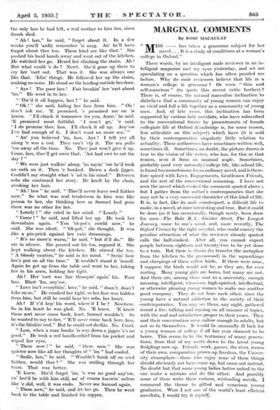MARGINAL COMMENTS
By ROSE MACAULAY
" MISS — has taken a gruesome subject for her novel ... It is a study of conditions at a woman's college in Oxford."
These words, by an intelligent male reviewer in an in- telligent magazine met my eyes yesterday, and set me speculating on a question which has often puzzled me before. Why do male reviewers believe that life in a woman's college is gruesome ? Or even "thin and self-conscious" (to quote this recent critic further) ? There is, of course, the natural masculine inclination to disbelieve that a -community of young women can enjoy as vivid and fall a life together as a community of young men. And, of late years, this inclination has been supported by -various lady novelists, who have subscribed to the conventional theory by presentments of female -collegiate life at Oxford (Cambridge -is, for some reason, less articulate on this subject) which have (it is said by their contemporaries) singularly little relation to actuality. These authoresses have sometimes written well, sometimes ill. Sometimes, no doubt, the picture drawn is true to the vision of the writer, who has, for this or that reason, seen it from an unusual angle. Sometimes, probably (and very naturally) college life, like school life, is found too monotonous for an ordinary novel, and is there- fore spiced with Love, Engagements, Gentlemen Friends, and the rest of the conventional seasoning. I have not seen the novel which evoked the -comment quoted above ; but I gather from the author's contemporaries that she may not be a very successful chronicler of this kind of life. It is, in fact, like its male counterpart, a difficult life to make, in a novel, at -once interesting and true. But it could be done (as it has occasionally, though rarely, been done for men—The Babe B.A., Sinister Street, The Longest Journey, come to one's mind, and, more recently, The Oxford Circus) by the right novelist, who could convey the peculiar attraction of what the reviewer already quoted calls the half-cooked. After all, you cannot expect people between eighteen and twenty-two to be yet done to a turn. But there is charm (to transfer the metaphor from the kitchen to the greenwood) in the squawldngs and cheepings of these callow birds. If there were none, I suppose, the birds would not be, as they are, for ever mating. Many young girls are bores, but many are not. And there are, among those sent to a university, enough amusing, intelligent, vivacious, high-spirited, intellectual, or otherwise pleasing young women to make one another good company. They do not bore each other, since the young have a natural addiction to the society of their -contemporaries. You may see them, any night, gathered round a fire, talking and arguing on all manner of topics, with the zeal and satisfaction proper to their years. They and their conversation seem callow enough to adults, but not so to themselves. It would be unusually ill luck for a young woman at college if all her year chanced to be bores. This seems to be the testimony of many genera- tions, from that of my aunts down to the latest young fledglings now up. Friends, work, games, the river, rooms of their own, comparative grown-up freedom, the Univer- sity atmosphere—those who enjoy none of these things should obviously not have come up, but come out instead. No doubt but that some young ladies better suited to the one make a mistake and do the other. And possibly some of these write these curious, misleading novels. I commend the theme to gifted and veracious young graduates. Were I not one of the world's least efficient novelists, I would try it myself. -










































 Previous page
Previous page